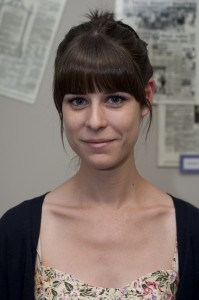It began with a rat.
A tiny creature by the name of Rosie: grey, with bright eyes, tiny little hands and a penchant for corn and broccoli.
Rats make the most delightful pets; they are intelligent, inquisitive, can be trained to do tricks and to come when called upon. If treated well, they will develop a genuine bond with their owners.
Unfortunately their life span, at two to three years, is painfully short. Little Rosie died in my 11 year old sister’s arms one night, leaving us both distraught; the first comprehensible experience of death our young minds had experienced.
The next day at school remains one of the most hauntingly affecting images of my youth. I entered the classroom after lunch to find my science teacher setting up the afternoon’s class work.
In the cruellest of coincidences, I gazed upon the ‘specimen,’ on the lab bench—upon the dead rat that we were to watch him hack up in the name of science and education. Oh, and did I mention that dead rat looked exactly like Rosie? It did.
That tiny defeated creature, balanced so precisely and scientifically before of a classroom of curious 13 years olds will be forever ingrained into my memory.
I snuck into the corridor and wept for that rat, for Rosie, and for all the voiceless and powerless creatures of our world. The realisation that ours is an existence built not callously, but casually upon the suffering of animals was crystallised in my young mind by a creature not born to live, but bred to die.
That day I swore to myself never to touch meat again.
Vegetarianism came about as a sudden and immediate lifestyle change, one which I was determined to do right. I gradually began to phase out foods from my diet that included, what might be described as, ‘hidden’ animal ingredients.
I first stopped eating lollies and jellies, because they contain gelatine, a substance derived from the collagen inside an animal’s skin and bones.
Cheeses had to go next, because most (though not all) are set using rennet, an enzyme extracted from the stomachs of slaughtered calves.
I continued researching and suddenly animal ingredients were popping up everywhere, disguised in many cases as flavour enhancers and food colourings, hidden in ingredient lists as numbers and letters.
Many of the foods I had simply assumed to be vegetarian friendly were revealed to be anything but.
The food dye E120, for example, is used to colour foods red and orange. It is made from the boiled, crushed scales of female cochineal insects. You’ll find it in everything from confectionary to fruit juices. Yum.
Yet several years after converting to this very strict form of vegetarianism, my conscience remained uneasy, for vegetarianism recognised only the suffering of the creature that is slaughtered for its flesh.
I needed something that was all encompassing, a lifestyle that acknowledged the whole spectrum of animal exploitation and understood that suffering doesn’t begin in and end at the slaughter yard.
By not consuming dairy products, vegans refuse to fund an industry that keeps cows in an almost continuous state of pregnancy, separating them from their offspring after each birth and killing the calves as ‘waste products’.
Similarly, by avoiding eggs, vegans avoid contributing to the cruelty endured by Australia’s 11 million battery hens, imprisoned in cages smaller than one A4 sheet of paper, as well as to the deaths of 12 million male chicks, useless to the egg farming industry, that are gassed or crushed alive each year.
The most common defence I hear for mankind’s exploitation of animals is, ‘it’s natural’ (thanks for that Sam Neill). However, there is nothing natural about the way we currently raise and farm animals. Factory farming is an ever-moving conveyer belt of horror that reduces living creatures to commodities, objectifying and stripping them of any inherent right to dignity, respect or a natural life.
Veganism is not perfect; I am not naive enough to believe that there is no animal cost in the farming, harvesting and production of vegan foods. But veganism is not about perfection, it is a plea for compassion, a stance against indifference and a hope for an end to unnecessary suffering.
Also, vegan cupcakes are really quite delicious.
 Alyce Hogg is doing a Bachelor of Journalism with Honours. She spent last year making rosettes on flat whites and lattes in a Fitzroy cafe, before deciding to return to university this year with the lofty aspiration of living off Centrelink. She has previously interned at the Warrnambool Standard, and is interested in writing about environmental issues and animal rights.
Alyce Hogg is doing a Bachelor of Journalism with Honours. She spent last year making rosettes on flat whites and lattes in a Fitzroy cafe, before deciding to return to university this year with the lofty aspiration of living off Centrelink. She has previously interned at the Warrnambool Standard, and is interested in writing about environmental issues and animal rights.






